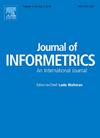An empirical study of retractions due to honest errors: Exploring the relationship between error types and author teams
IF 3.5
2区 管理学
Q2 COMPUTER SCIENCE, INTERDISCIPLINARY APPLICATIONS
引用次数: 0
Abstract
By adopting binary logistic regression and using a dataset of retractions due to honest errors, this paper analyses the relationships between types of honest errors and the characteristics of author teams, aiming to make recommendations about research management for researchers and policy makers. The results show that (1) honest errors made by medium-sized teams are more likely to be data errors rather than other types of errors, than those made by other-sized teams; (2) overall, there is no obvious relationship between types of honest errors and collaboration patterns; (3) there is no significant difference in the probability that honest errors are data errors rather than other types of errors (called “the probability”), with or without the participation of US authors. Honest errors made by teams with the participation of Chinese authors are less likely to be data errors, than those made by teams without Chinese authors; (4) collaboration patterns moderate the relationship between types of honest errors and the participation of Chinese authors. Specifically, the probability is significantly greater for single-authored publications in China than in other countries, and the probability for domestic collaboration in China is much lower than that outside China. There is no significant difference in the probability for international collaboration publications in China and those in other countries.
对因诚实错误而撤稿的实证研究:探索错误类型与作者团队之间的关系
本文采用二元逻辑回归法,利用因诚实错误而撤稿的数据集,分析了诚实错误类型与作者团队特征之间的关系,旨在为研究人员和政策制定者提供研究管理建议。结果表明:(1) 与其他规模的团队相比,中等规模团队所犯的诚实错误更有可能是数据错误,而不是其他类型的错误;(2) 总体而言,诚实错误的类型与合作模式之间没有明显的关系;(3) 无论是否有美国作者参与,诚实错误是数据错误而不是其他类型错误的概率(称为 "概率")没有显著差异。与没有中国作者参与的团队相比,有中国作者参与的团队所犯的诚实错误不太可能是数据错误;(4) 合作模式缓和了诚实错误类型与中国作者参与之间的关系。具体来说,在中国发表的单篇论文的概率明显高于在其他国家发表的论文,而在中国国内合作发表的论文的概率远低于在国外发表的论文。中国的国际合作出版物与其他国家的国际合作出版物在概率上没有明显差异。
本文章由计算机程序翻译,如有差异,请以英文原文为准。
求助全文
约1分钟内获得全文
求助全文
来源期刊

Journal of Informetrics
Social Sciences-Library and Information Sciences
CiteScore
6.40
自引率
16.20%
发文量
95
期刊介绍:
Journal of Informetrics (JOI) publishes rigorous high-quality research on quantitative aspects of information science. The main focus of the journal is on topics in bibliometrics, scientometrics, webometrics, patentometrics, altmetrics and research evaluation. Contributions studying informetric problems using methods from other quantitative fields, such as mathematics, statistics, computer science, economics and econometrics, and network science, are especially encouraged. JOI publishes both theoretical and empirical work. In general, case studies, for instance a bibliometric analysis focusing on a specific research field or a specific country, are not considered suitable for publication in JOI, unless they contain innovative methodological elements.
 求助内容:
求助内容: 应助结果提醒方式:
应助结果提醒方式:


